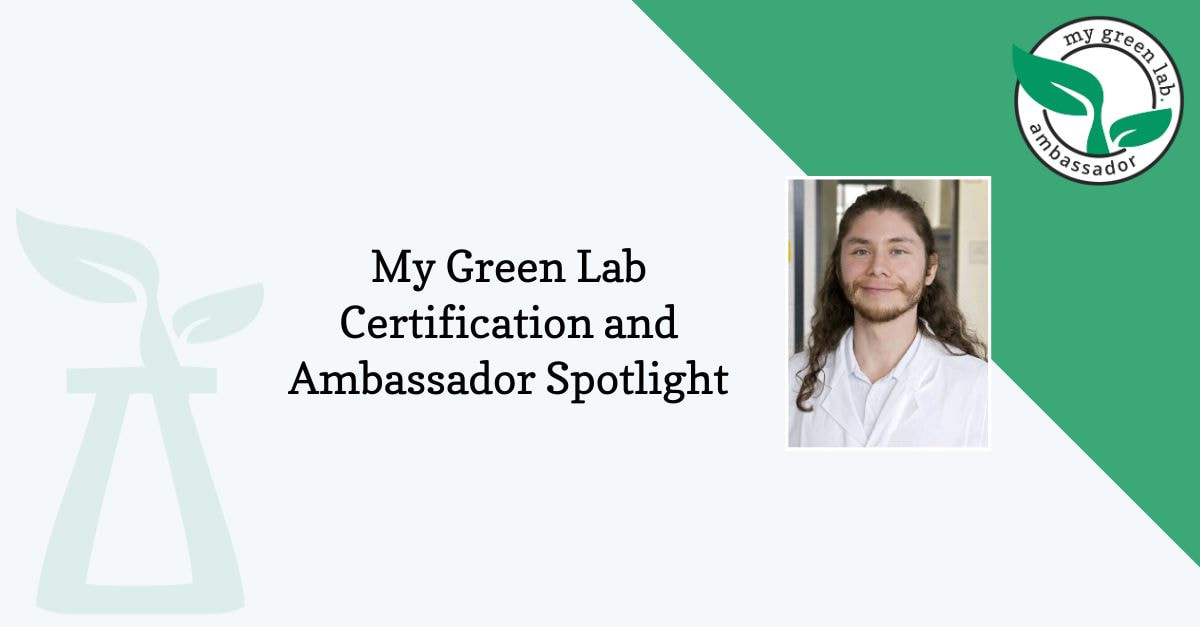|
We're thrilled to spotlight Sven Duda, an accomplished member of the green labs community who is not only a dedicated My Green Lab Ambassador but has also helped the Chair of Applied and Molecular Microbiology in the Biotechnology Institute at the Technische Universität Berlin achieve My Green Lab Certification.
Sven, a research associate at Technische Universität Berlin and a My Green Lab Ambassador, is deeply committed to fostering a culture of sustainability. Through the My Green Lab Certification process, Sven and his colleagues at the Chair of Applied and Molecular Microbiology have enhanced their lab's sustainability practices. His commitment exemplifies the transformative potential of collective action and the power of small changes in driving meaningful progress towards a more sustainable future. Learn more about the Ambassador Program and My Green Lab Certification through Sven’s journey, detailed below. Please tell us a bit about yourself. My name is Sven Duda. I was born and raised in Berlin, Germany. I’m currently working at the Technische Universität Berlin as a research associate deeply involved both in my research project working with fungi and the implementation of sustainability measures within our laboratory and university. Apart from my academic pursuits, I’m also a passionate Touch Rugby player. In addition to my main roles of researching, assisting purchasing, and student supervision, I am an assigned sustainability manager. Together with my Applied and Molecular Microbiology department colleagues, we worked our best to achieve a My Green Lab Certification in November 2023. Let’s chat about your experience with My Green Lab Certification. Before launching the program, what challenges were your lab facing concerning lab sustainability and engagement? Before the certification process, we had implemented some sustainability practices, but there were challenges. For example, we share our resources with other departments at the Technische Universität Berlin. And while we are trained to use the devices and talk about the contamination risks beforehand, we did not have a good overview of which devices utilize which quantities of electricity, and there was no point of reference for what a kWh is and how much polluting potential this encased. This made our decisions on saving energy tough. Can you share a bit about your experience going through My Green Lab Certification – including what you learned and sustainability success stories within your lab? My experience through the My Green Lab Certification process was very encouraging. The progress report results from our baseline assessment shared clear instructions for sustainability best practices, databases to work with, and positive feedback on things that had been working. This report, along with the contact we had with the My Green Lab team personally, motivated me to go further and think of more sustainable measures to share with my colleagues and others from the Technische Universität Berlin. It really is the small things that can make a big difference. For example, the utilization of stickers to make colleagues aware of shutting down devices that don't take long to turn on (clean benches and their lights, vortexers, light switches on the hallways, etc.). Also, the utilization of outlet timers on water baths or drying ovens for a more effective usage of time and electricity. They are such an everyday tool at home, but we hadn’t thought about using them in the lab! The certification showed us how to think outside of the box and try ways to be more sustainable and be more responsible when researching and experimenting. Can you share any data that suggests improvement on sustainability parameters? By taking out 50% of our neon tubes from the hallway and disconnecting devices that we don't need on at night, we estimate that we have reduced electricity waste by at least 20% in comparison to before the certification process. In order to create a better overview of electricity usage in our department, more numbers and measurements are in preparation with the Occupational Health and Safety Services and Environmental Protection departments of the Technische Universität Berlin. What effect did the certification process have on the sustainability culture within your organization? We realized that the My Green Lab Certification is not only a sustainability certification, but also a great teamwork builder! The program drove me to start attending university events and department talks to share our experience with those who can profit from our work in developing science for our community in a sustainable way. What is the most interesting thing you learned while becoming a My Green Lab Ambassador? The My Green Lab Ambassador Program educated me on the basis of sustainability in a lab! Many of the things we do in the lab, even the good things, are done because they were written or decided years ago without re-checking their effectiveness. The Ambassador Program motivated me to talk openly with my colleagues about which sustainability measures we need to implement or improve. The most interesting thing I learned was that, as I mentioned before, small changes in the lab, as well as our perception, can make a big impact on our way of working and using resources. How has the My Green Lab Ambassador Program enriched your sustainability journey? The My Green Lab Ambassador Program enriched my and the Chair of Applied and Molecular Microbiology's sustainability journey by showing us that this is not a journey we need to do alone. It encouraged me to get other colleagues at the Technische Universität Berlin involved and help ‘activate’ them with the reason they began their careers in science: curiosity. Comments are closed.
|
Sign Up for Our Newsletter! |
Contact UsCopyright 2013-2024 My Green Lab®, all rights reserved.
About My Green LabMy Green Lab® is a 501c3 non-profit organization.
All gifts are tax deductible in accordance with IRS regulations. |

